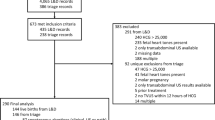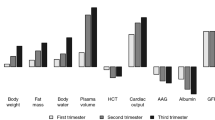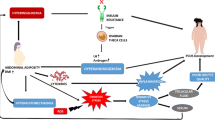Abstract
Polycystic ovary syndrome (PCOS) affects 8–10% of women. NIH criteria for diagnosis include chronic anovulation and evidence of clinical or biochemical hyperandrogenism. PCOS is associated with adverse neonatal outcomes. Our hypothesis is that insulin resistance is increased in fetuses born to women with PCOS. This is a prospective cohort of women who delivered at our institution. Subjects with a body mass index < 20 or ≥ 50 kg/m2, multiple gestation, and major fetal malformations were excluded. Maternal blood was collected at admission, and umbilical cord blood was collected after delivery. Serum concentrations of insulin and glucose were measured from each sample. The homeostasis model assessment index of insulin resistance (HOMA-IR) was calculated (plasma glucose (mmol/L) × insulin (μU/mL)/22.5). The HOMA-IR from mothers and fetuses with PCOS was compared with mothers and fetuses without PCOS (controls). Mann-Whitney U test was utilized for statistical analysis. Forty-six women and fetal pairs were included; 28 with PCOS and 18 controls. Maternal insulin (20 [7.7–26.5] vs. 6.6 μU/ml [5.1–7.2]; p = 0.005) and HOMA-IR (3.9 [1.6–4.5] vs. 1.1 [0.9–1.3]; p = 0.01) were increased in the PCOS group. There was no statistical difference in fetal insulin, glucose, or HOMA-IR (p = 0.31) in the umbilical artery (p = 0.10; p = 0.34; p = 0.45, respectively) or the umbilical vein (p = 0.13; p = > 0.99; p = 0.31, respectively). Insulin resistance is present in non-diabetic pregnant women with PCOS, however not in their fetuses. This might explain variations in the occurrence of the adverse neonatal and maternal outcomes reported in PCOS.



Similar content being viewed by others
References
Amsterdam EA-SrPCWG. Consensus on women’s health aspects of polycystic ovary syndrome (PCOS). Hum Reprod 2012;27(1):14–24.
Dumesic DA, Goodarzi MO, Chazenbalk GD, Abbott DH. Intrauterine environment and polycystic ovary syndrome. Semin Reprod Med. 2014;32(3):159–65.
Palomba S, de Wilde MA, Falbo A, Koster MP, La Sala GB, Fauser BC. Pregnancy complications in women with polycystic ovary syndrome. Hum Reprod Update. 2015;21(5):575–92.
Dunaif A. Insulin resistance and the polycystic ovary syndrome: mechanism and implications for pathogenesis. Endocr Rev. 1997;18(6):774–800.
Hodson K, Man CD, Smith FE, Thelwall PE, Cobelli C, Robson SC, et al. Mechanism of insulin resistance in normal pregnancy. Horm Metab Res. 2013;45(8):567–71.
Preterm labour and birth.2015.
Boomsma CM, Eijkemans MJ, Hughes EG, Visser GH, Fauser BC, Macklon NS. A meta-analysis of pregnancy outcomes in women with polycystic ovary syndrome. Hum Reprod Update. 2006;12(6):673–83.
Dunaif A GJ, Haseltine FP, Merriam GR, editors. Polycystic ovary syndrome. Boston (MA): Blackwell Scientific Publications; 1992.
Matthews DR, Hosker JP, Rudenski AS, Naylor BA, Treacher DF, Turner RC. Homeostasis model assessment: insulin resistance and beta-cell function from fasting plasma glucose and insulin concentrations in man. Diabetologia. 1985;28(7):412–9.
Gonzalez F. Inflammation in polycystic ovary syndrome: underpinning of insulin resistance and ovarian dysfunction. Steroids. 2012;77(4):300–5.
Dunaif A, Segal KR, Futterweit W, Dobrjansky A. Profound peripheral insulin resistance, independent of obesity, in polycystic ovary syndrome. Diabetes. 1989;38(9):1165–74.
Detti L, Jeffries-Boyd HE, Williams LJ, Diamond MP, Uhlmann RA. Fertility biomarkers to estimate metabolic risks in women with polycystic ovary syndrome. J Assist Reprod Genet. 2015;32(12):1749–56.
Esteghamati A, Ashraf H, Khalilzadeh O, et al. Optimal cut-off of homeostasis model assessment of insulin resistance (HOMA-IR) for the diagnosis of metabolic syndrome: third national surveillance of risk factors of non-communicable diseases in Iran (SuRFNCD-2007). Nutr Metab (Lond). 2010;7:26.
Sterling L, Liu J, Okun N, Sakhuja A, Sierra S, Greenblatt E. Pregnancy outcomes in women with polycystic ovary syndrome undergoing in vitro fertilization. Fertil Steril. 2016;105(3):791–7 e792.
Boomsma CM, Fauser BC, Macklon NS. Pregnancy complications in women with polycystic ovary syndrome. Semin Reprod Med. 2008;26(1):72–84.
Palomba S, Falbo A, Russo T, Tolino A, Orio F, Zullo F. Pregnancy in women with polycystic ovary syndrome: the effect of different phenotypes and features on obstetric and neonatal outcomes. Fertil Steril. 2010;94(5):1805–11.
Escobar-Morreale HF, Luque-Ramirez M, Gonzalez F. Circulating inflammatory markers in polycystic ovary syndrome: a systematic review and metaanalysis. Fertil Steril. 2011;95(3):1048–1058 e1041–1042.
Duleba AJ, Dokras A. Is PCOS an inflammatory process? Fertil Steril. 2012;97(1):7–12.
Liu B, Xu Y, Liang JM, Voss C, Xiao HY, Sheng WY, et al. Intrauterine insulin resistance in fetuses of overweight mothers. J Obstet Gynaecol Res. 2013;39(1):132–8.
Catalano PM, Presley L, Minium J, Hauguel-de MS. Fetuses of obese mothers develop insulin resistance in utero. Diabetes Care. 2009;32(6):1076–80.
Puttabyatappa M, Cardoso RC, Padmanabhan V. Effect of maternal PCOS and PCOS-like phenotype on the offspring’s health. Mol Cell Endocrinol. 2016;435:29–39.
Detti L, Christiansen ME, Francillon L, Ikuwezunma G, Diamond MP, Mari G, et al. Serum anti-Mullerian hormone (AMH) in mothers with polycystic ovary syndrome (PCOS) and their term fetuses. Syst Biol Reprod Med. 2019;65(2):147–54.
Mehrabian F, Kelishadi R. Comparison of the metabolic parameters and androgen level of umbilical cord blood in newborns of mothers with polycystic ovary syndrome and controls. J Res Med Sci. 2012;17(3):207–11.
Edlow AG, Hui L, Wick HC, Fried I, Bianchi DW. Assessing the fetal effects of maternal obesity via transcriptomic analysis of cord blood: a prospective case-control study. BJOG. 2016;123(2):180–9.
Dabelea D, Pettitt DJ. Intrauterine diabetic environment confers risks for type 2 diabetes mellitus and obesity in the offspring, in addition to genetic susceptibility. J Pediatr Endocrinol Metab. 2001;14(8):1085–91.
West NA, Crume TL, Maligie MA, Dabelea D. Cardiovascular risk factors in children exposed to maternal diabetes in utero. Diabetologia. 2011;54(3):504–7.
Dabelea D, Mayer-Davis EJ, Lamichhane AP, D'Agostino RB Jr, Liese AD, Vehik KS, et al. Association of intrauterine exposure to maternal diabetes and obesity with type 2 diabetes in youth: the SEARCH case-control study. Diabetes Care. 2008;31(7):1422–6.
Barker DJ. The developmental origins of insulin resistance. Horm Res. 2005;64(Suppl 3):2–7.
Barker DJ. The fetal and infant origins of disease. Eur J Clin Investig. 1995;25(7):457–63.
Wang Q, Huang R, Yu B, Cao F, Wang H, Zhang M, et al. Higher fetal insulin resistance in Chinese pregnant women with gestational diabetes mellitus and correlation with maternal insulin resistance. PLoS One. 2013;8(4):e59845.
Walsh JM, Byrne J, Mahony RM, Foley ME, McAuliffe FM. Leptin, fetal growth and insulin resistance in non-diabetic pregnancies. Early Hum Dev. 2014;90(6):271–4.
Zhang F, Xiao X, Liu D, Dong X, Sun J, Zhang X. Increased cord blood angiotensin II concentration is associated with decreased insulin sensitivity in the offspring of mothers with gestational diabetes mellitus. J Perinatol. 2013;33(1):9–14.
Simental-Mendia LE, Castaneda-Chacon A, Rodriguez-Moran M, Guerrero-Romero F. Birth-weight, insulin levels, and HOMA-IR in newborns at term. BMC Pediatr. 2012;12:94.
Author information
Authors and Affiliations
Corresponding author
Ethics declarations
Conflict of Interest
The authors declare that they have no conflicts of interest.
Ethical Approval
This protocol was approved by the University of Tennessee Institutional Review Board and by the office of research of Regional One Health, Memphis, TN. The study is currently registered at ClinicalTrials.gov (NCT02429349).
Statement of Informed Consent
Written informed consent was obtained from each patient.
Additional information
Publisher’s note
Springer Nature remains neutral with regard to jurisdictional claims in published maps and institutional affiliations.
Rights and permissions
About this article
Cite this article
Tobiasz, A.M., Duncan, J.R., Detti, L. et al. Lack of Fetal Insulin Resistance in Maternal Polycystic Ovary Syndrome. Reprod. Sci. 27, 1253–1258 (2020). https://doi.org/10.1007/s43032-019-00125-1
Received:
Accepted:
Published:
Issue Date:
DOI: https://doi.org/10.1007/s43032-019-00125-1




